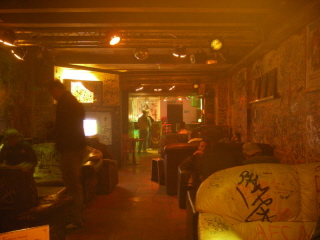A Dutch court Thursday fined a Terneuzen cannabis coffee shop owner $10 million Euros (more than $13 million US dollars), after convicting him and 15 others, including former employees, of drug trafficking and involvement in a criminal organization because the coffee shop's stash exceeded what is allowed by Dutch law.

But Checkpoint, near the Belgian border, was reportedly serving up to 3,000 customers a day at its peak. If each customer bought the allowed five grams, that would add up to 15,000 grams. If Checkpoint were to have complied with Dutch law, it would have had to have had someone bringing it a fresh pound of pot every few minutes.
The case is illustrative of the "backdoor problem," where, while Holland allows for the sale of marijuana at coffee shops, it has not adequately allowed for them to be supplied. As a result, supplying the coffee houses has become part of a $3 billion a year illicit cannabis cultivation industry that is increasingly infested by organized crime elements.
Still, the court said Willemsen got off lucky. He would have had to pay an even larger fine if Middelburg municipal authorities had not turned a blind eye to his activities."Checkpoint could not have expanded as much as it did without collaboration from the municipality of Middelburg," it said. "Also, the police never warned that the coffee shop had to scale down."
The Checkpoint case is being widely viewed as a test case for cracking down on large-scale border coffee shops that cater to a largely foreign clientele. The verdict is undoubtedly sending chills down the spines of other large border town coffee shop owners.
Willemsen better have sold a whole bunch of pot while his shop was open. He certainly has a huge fine to pay now.
This work by StoptheDrugWar.org is licensed under Creative Commons Attribution-ShareAlike 4.0 International
Add new comment